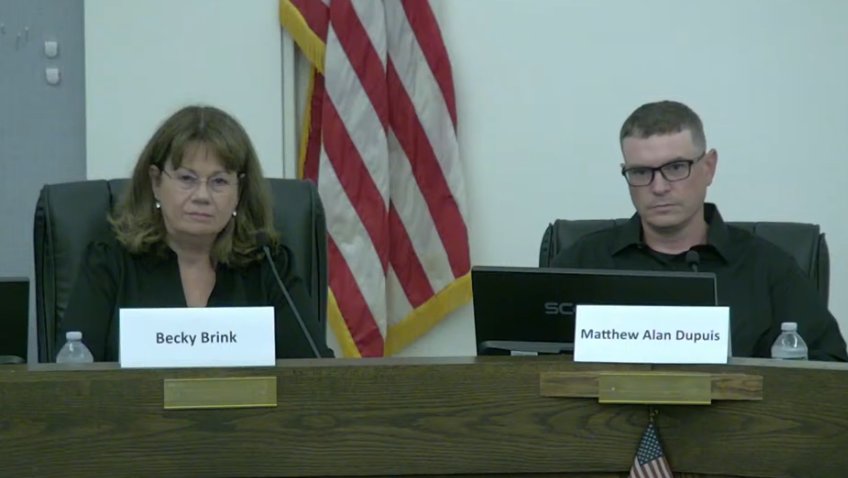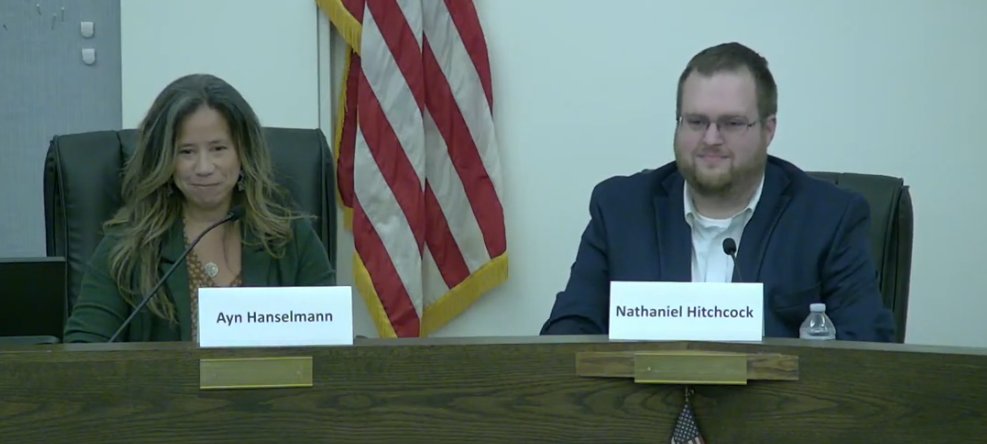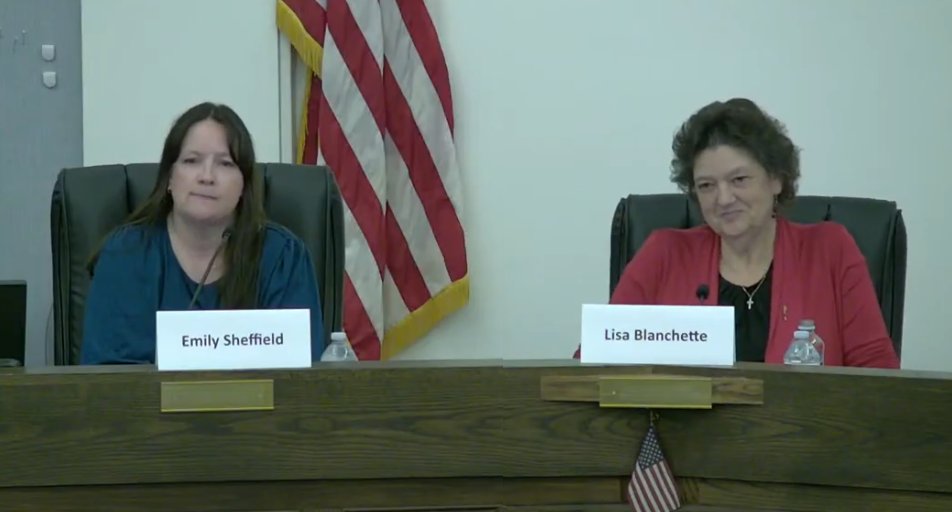Voices of Local Candidates Heard
- October 18th 2024
- Elections

Becky Brink and Matthew Dupuis
Photos: WSSR-TV
Candidates for Sanford mayor, City Council and School Committee answered questions posed by moderators Shawn Sullivan and Tammy Wells at City Hall on Oct. 8.
By Kendra Williams
MAYOR CANDIDATES
Incumbent Mayor Becky Brink, a former school principal who manages her family’s chiropractic practice, is challenged by Matthew Alan Dupuis, a master plumber who is active in local committees and youth sports.
Understanding of mayor role
Brink spoke of juggling multiple issues at once, being inclusive and taking opportunities to hear people. She also identified the importance of paying attention to what’s going on in communities around us and at the state levels, including collaborating with our state representatives.
Dupuis responded that cities face many challenges, including kids, schools and sports. He said there are some positive developments, including new companies coming to the city, and said that people need to come together “or we’ll keep going downhill.”
Vision and collaboration
Dupuis said he would like to see people come to Sanford to spend their money rather than elsewhere.
Brink focused on community growth and the need to set goals at the beginning of each year by the council bringing in stakeholders. Growth requires affordable housing, which has seen a lot of progress and continues to increase, she said. It also involves working with the local schools, including nearby colleges, for job training. Finally, she said, “ordinances need to be appropriate and not block development.”
Fostering community pride
The annual Police Night Out was an example Brink used of different departments hosting functions that bring our community together. She spoke of the importance of being involved in organizations and being visible. Another way is to have inviting meetings. Inappropriate comments from council members or attendees are not tolerated. And councilors have been committed to being mutually respectful even when they disagree.
Dupuis spoke of the need for togetherness as a community and the need for everybody to care about one another. He said, “there’s too much division.” He questioned whether being a city versus a town might have something to do with it.
Effective leadership
Dupuis told his story of wanting to enlist in the military from a young age. After a year of college, he joined the Army’s American Infantry.
Brink talked about success in being proactive when asylum seekers came to Sanford unexpectedly. She and the council sought help from a person with expertise in the needs of asylum seekers. They gave residents an opportunity to express their concerns, primarily focused on worries about capacity. That led to officials figuring out what our capacity was and not going beyond it.
Example of learning from failure
Dupuis said, “if you don’t fail you don’t learn.” He compared asylum seekers helping to pick up trash to homeless individuals who are “just messing up the city.” Asked the question again, his response was “people just need hope.”
Brink spoke about having dyslexia and the challenges she’s faced in reading out loud. She thinks she sometimes still fails when she’s tired. She took the opportunity of extra time to discuss the 19 Strategies for Homelessness plan that the city follows to address the challenges, which have resulted in a decrease from 250 to 44 unhoused people through hard work that continues.
Pressing unaddressed needs
Brink identified the need for two fire stations. She believes it’s best to move ahead with the project now while grants may be available rather than waiting, because OSHA will step in and force us to get new stations.
Dupuis agreed with Brink’s opinion on the fire stations. He sees the biggest problem facing Sanford is drugs. He said, “it takes a group to do it.”
Closing statements
Dupuis began by saying, “I’m not a politician.” He belongs to several local social clubs where he has an opportunity to have conversations with people. He sees the social clubs as organizations that raise money to benefit the community. His personal focus is raising money for youth sports. He said he values the city’s veterans. He ended by complimenting Mayor Brink for her work on behalf of the city.
Brink spoke about the goals she and the City Council have set. She listed several areas of progress in the past few years, including building permits for many home upgrades and new homes. She identified several new businesses and restaurants that have opened or are on the immediate horizon. In addition, York County Community College has opened a new school in South Sanford to educate workers for Pratt & Whitney and the Portsmouth Naval Shipyard. She sees all of this as just the beginning and would like to continue working towards the city’s goals.
CITY COUNCIL CANDIDATES

Ayn Hanselmann and Nathanial Hitchcock
Note: Two candidates, Joseph Hanslip and Victor Digregorio, had personal circumstances that prevented them from attending.
Opening statements
Incumbent Ayn Hanselmann is in her second term as a city councilor and is the chair of two subcommittees. She’s an accountant and co-owner of a local accounting firm and the co-owner of Frannie’s Mini Donuts. She’s also a board member and volunteer with several local organizations.
Incumbent Nathaniel (Nathan) Hitchcock has filled a vacancy since April of 2023. A Sanford native currently living in Springvale, he’s a trial attorney. He’s also a board member of the Sanford Mainers and a trustee of the Sanford Sewerage District. He believes listening is the key to being an effective councilor.
Questions
Support for new fire stations
Hanselmann expressed full support for the two proposed fire stations and believes the community is in favor. She doesn’t see that there’s any doubt about the need. Rather the concerns many people have expressed are related to affordability. She recognizes there is pressure on the council going forward to minimize the tax impact and to work on acquiring grants, leveraging funding and reducing operating expenditures to minimize the impact on taxation.
Hitchcock is in favor. He understands the tax impact will affect everyone in Sanford. He’s concerned the competitiveness for funding is going to increase if we don’t do it now and that a delay would increase costs by about $2 million a year. There’s federal funding available and he believes it’s incumbent on the council to work with state legislators to change some laws to reappropriate funding. “The question is, if not now, when?” he said. He encouraged people to watch the informative forum from a few weeks ago on WSSR TV.
Large campgrounds
Hitchcock called for “a nuanced approach” to proposals for large campgrounds. He sees a need to balance property values for current residents while allowing for business development. He trusts that the Planning Board will come up with recommendations for the City Council in the development of an ordinance.
Hanselmann sees campgrounds as an opportunity for economic development and growth that would help to diversify our tax base. There’s also a desire to increase visitors to our community. She agreed that a balanced approach is needed to ensure current property owners are not negatively impacted.
Unhoused population
Hanselmann has been involved in working extensively with the Homelessness Task Force since its inception. “We’re not 100 percent successful but we’re trying as hard as we can,” she said. The Police Department and funding for its mental health worker have been instrumental in the efforts. Also significant are partnerships with non-profits in our community. The Sanford Housing Authority, York County Community Action and others have had a great impact, she said. She recognized there’s a lot of work still to be done.
Hitchcock said he has found housing to be a major component of the council’s work. He said, “focusing on housing is definitely long term. It’s not something that can be fixed in an instant, but efforts are definitely being made.” He spoke of the Housing First program currently being developed that will help to stabilize people so they’re able to focus on the challenges that prevent them from having permanent, stable housing.
Approach to the budget
Having now been through one budget process, Hitchcock said he feels he has learned from Councilor Hanselmann’s approach. Going forward, he intends to scrutinize the budget to find things to cut and alternative means of funding. At the forefront of his mind will be how the council recommendations will affect taxpayers and renters. His priorities will include public safety and road development. He recognizes the difficulty of decisions that need to be made.
Hanselmann spoke of being the minority vote with Hitchcock this past year to take a second look at the budget for additional cuts before final approval. She’d like to change the order of the budget process and shift to considering the municipal budget before the school budget. She believes they would have more energy and enthusiasm for looking closely at it if it comes first. Regarding priorities, public safety needs to be in the forefront, she said. She’d like to look at the Capital Improvement Program budget to consider cutting some unfilled positions.
Downtown business climate
Hanselmann said she believes the downtown is heading in the right direction. As the owner of a small downtown business, she sees people willing to travel 30 minutes or more to come to her business and to the recently opened niche business, Knots and Bolts. She’s confident that if we can bring more businesses to the downtown “they will come.” Things are in motion through Sanford’s Growth Council, such as façade grants. They, as well as The Friends of Downtown of which she is an active member, are working with current and potential businesses and making great progress.
Hitchcock acknowledged that downtown improvement is a slow process. But through his involvement with the Sanford Mainers, he sees more people coming to the store and to games. Efforts are happening to work on buildings that have historical significance but are not attracting people to the downtown. Balance and patience are needed to preserve history while developing them for future use. Overall, the growth efforts for the downtown are producing great results, he said.
Perception that city councilors don’t listen
Hitchcock said listening to people “has been one of the cornerstones of my tenure here and what I would continue to do if I’m re-elected.” He’s grateful to Mayor Brink’s emphasis on education but it’s possible it’s not getting through to the public. He spoke of needing more opportunities like the forum about the fire stations to bring people in for larger discussions.
Hanselmann jokingly said, “everything leads back to the orange trash bags.” There are still people disgruntled about having to buy trash bags and use them as an example of not being listened to. Another example has been the trails. She spoke of the responsibility of listening to each person but also making decisions for the betterment of the whole community. She sees councilors being accessible and willing to talk to people as one way to repair that perception. She also agreed that more community forums would be helpful. She concluded by saying “we need to build trust with folks and just make sure they know that we do hear them even if we don’t vote the way they want us to.”
Closing statements
Hanselmann described some of the many challenges in being a councilor. However, she’s driven by “a desire to be a part of the bright future I know exists for Sanford.” She sees it happening but also knows it takes time and is encouraged by the things that have finally come to fruition since she became a councilor six years ago. She loves Sanford and wants to see it be a place where our young people return to live, work and raise their families.
Having spent some of his formative years in Sanford, Hitchcock said, “I’m one of those people who came back.” He wants to foster a vision of this being a place that feels like home but can aspire to see it grow. Changes are happening and he wants “to be a part of navigating those changes.” He thinks it’s important for people to be heard and cited several examples of issues, including the need for more businesses, homelessness, drugs and affordable housing. He sees progress in all those areas.
SCHOOL COMMITTEE
Note: Jonathan Stimmell is a candidate for a one-year vacancy. He was not asked to participate because he’s running unopposed. The two candidates who appeared are seeking one three-year term.

Emily Sheffield, left, and Lisa Blanchette
Opening statements
Incumbent Emily Sheffield has lived in Springvale for 19 years and has an adult son and daughter. She’s the executive director of the Nasson Community Center and Little Theater. She is currently completing a one-year term to which she was appointed to fill a vacancy. She had previously served a full term a few years ago. She serves on the Safety and SRTC Advisory Committees. She also sits on Sanford’s Board of Assessment Review and is an active volunteer with other local organizations.
Challenger Lisa Blanchette grew up in Sanford and graduated from Sanford High School. She and her husband raised their three children, all SHS graduates, here and they now have three grandchildren in the Sanford schools. She worked for 40 years in various roles at Sanford Community Adult Education. She serves on several community non-profit boards, including the Alumni Association and is the president of Strategies for a Stronger Sanford.
Questions
Budget priorities, non-negotiables
Sheffield considers every aspect of the budget to be important and recognizes education has changed in the last several years. This past year, she helped make decisions about the budget that some weren’t happy with. She said social workers for the schools are a non-negotiable item. She acknowledged that Alternative Education could be reconsidered this year.
Blanchette said she believes there is always room for negotiation to avoid eliminating an entire program, which she considers non-negotiable. She doesn’t believe we should eliminate all of any one type of position. She said, “we need to look at what is needed and what is wanted. We must keep what is needed. But if there’s a way to cut back on something that makes sense and still serves our students, then that is what we have to do.”
Student hearings
Blanchette would consider addressing how the schools handle violations of substance abuse and violence policies and whether there’s leeway to make decisions based on individual cases. She would also consider the circumstances and facts of what happened and get input from others who are affected by the situation.
Sheffield acknowledged she’s found student hearings to be very difficult and emotional. She has compassion for the students but recognizes they need to be held accountable. “The entire school population needs to be considered and policies need to be followed,” she said.
Banning of cell phones
Sheffield began by encouraging parents to read the book, “An Anxious Generation,” which is an in-depth look at cell phones and social media. The School Committee has heard clearly that cell phones are disruptive. Members have looked at the current policy and have sent out surveys to parents, students and teachers. They’re now reviewing them and planning a workshop in a few weeks. She believes the current policy is working due to the threat of having phones taken away entirely. She doesn’t know the answer, but after reading that book, she would have done things differently as a parent.
Blanchette would be interested in the results of the surveys. She referred to the swatting incident that occurred a few years ago. Before realizing the threat was unfounded, her anxiety was reduced when her grandson was able to text that he was safe. However, she thinks the cell phones in the classroom should be turned off and in the students’ backpacks.
Decisions about controversial issues
Blanchette would rely on staff and others who have experience with the issue. She would also use the internet to research further and base her decisions on what she learns.
Sheffield also looks to the experts. She trusts and values input from the directors and administrators. She also values the voices of parents.
School safety
Sheffield does think the students feel safe. “We have a top-notch administration and police department who care deeply about our children,” she said. As a member of the Safety Committee, she knows they’re doing everything possible to keep students safe. She doesn’t know what else can be done to ease the anxiety of parents but wants them to know that student safety is always a priority.
Blanchette agreed that students feel safe, and parents feel it’s safe to send their children to school. She said having resource officers in the schools helps them to feel safe. She thinks it’s important to be vigilant in following policies and that students, parents and others need to feel safe in reporting what they see and hear. And attention needs to be paid to what’s on social media.
Role of schools in student mental health
Blanchette said she believes we should be listening to the mental health professionals in our schools. Also, research shows it’s not just about academics. Supporting and engaging students in activities outside of school as well as extracurricular activities in the schools is as important.
Sheffield said personal experience has taught her that it’s crucial to keep mental health services in our schools. If services are not available to those who need them, students’ school/life balance suffers and they “don’t get the quality education they deserve.”
Closing statements
After serving a previous full term and an interim term, Sheffield said she would like to continue and to focus on fiscally responsible decisions and student achievement. She sees herself as an effective leader and good communicator. She’s wants our schools to be “top notch, safe and sought after.” She believes in schools and communities having a mutually supportive relationship. Although she no longer has children in our schools, she said she still cares deeply about all children.
Blanchette’s decision to seek a seat on the school committee stemmed from the controversial proposal last spring to cut the Alternative Education program. She wanted to make sure voices were heard. If elected, she promises to always listen and to do the research necessary to make the best decisions possible. She pledged to make decisions based on what she believes is right, whether she’s in the majority or minority.
View the Local Candidates Night on YouTube at https://www.youtube.com/watch?v=h9tVE16Ao50
Read our coverage of the Candidates Night for state legislative candidates at sanfordspringvalenews.com.






